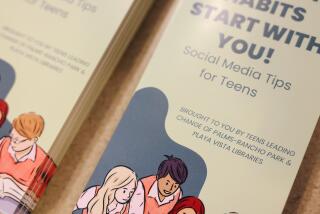Truth is, it’s best if they know
Truth sometimes hurts. But for children closing in on adolescence, a firm grasp on the truth about one’s standing with classmates and peers can be healthy, even when it does hurt a bit.
A new study has found that children who can accurately assess how much -- or little -- their peers like them are less likely to develop symptoms of depression, including sadness and difficulties concentrating or sleeping. By comparison, children with unrealistically rosy or unfoundedly gloomy views of their standing appear more likely to be headed toward depression.
Many psychologists have speculated that the smiling child who believes she is the glowing sun in her classmates’ universe will be protected from depression by that belief. They also surmised that the child who holds a negative view of his status among peers is more prone to maladjustment and depression.
That picture, says Florida State University psychologist Janet Kistner, may be a bit too simple. She and fellow researchers found that the child who is not regarded well by peers -- and knows it -- is actually less likely to grow more depressed over time than the child who believes that classmates like him when, in fact, they don’t. The kid who can see that he is not so well-liked may be better able to change his behavior to make friends, Kistner says. The kid who’s clueless about her effect on classmates may grow frustrated and sad as she misses social cues and fumbles gestures of friendship.
“Realistic perceptions,” Kistner says, “are a hallmark of mental health.”
The study is the latest in a welter of efforts to identify which children and adolescents may be at heightened risk for developing depression and mental illness.
Some politicians, public health officials, mental health activists and pharmaceutical companies have worked to establish mental-health screening programs in schools and the community. Those initiatives, including a model program designed at Columbia University called TeenScreen, aim to steer kids who are more likely to develop depression toward help before their emotional difficulties lead them to risky behaviors, academic failure or suicide attempts. In recent years, six states -- Ohio, Florida, Pennsylvania, Nevada, Iowa and New Mexico -- have moved to adopt programs that screen schoolchildren for warning signs of mental illness, including depression. Elsewhere, individual school districts have followed suit.
Those efforts have proven controversial. Many parents fear their children will be labeled as mentally ill and marked for special attention because they have expressed sentiments typical of adolescents. Others caution that there are few services and scant psychiatric help available for the millions of children that could be identified. And many suspect such screens are drug company-sponsored efforts to build the market for antidepressants.
Researchers and clinicians, meanwhile, say they are far from having developed accurate predictors of a child developing depression. The younger the child, the murkier the crystal ball.
Dr. Daniel Pine, chief of child and adolescent research at the National Institute of Mental Health’s Mood and Anxiety Disorders Program, says that the strongest signs that a child may develop depression are a personal history of anxiety in early life; a parent with past or current depression; and a childhood pattern of low-level depressive symptoms (sadness, difficulties with eating, sleeping or concentrating, loss of energy or interest in once-enjoyed activities).
Beyond those signals, Pine says, disruptions in peer and social relationships often come with depression. But whether those ruptures are the cause of a depressive episode or the result -- or a little of both -- is not known.
“There are a lot of unanswered questions,” he says.
In the study, published in the latest issue of the Journal of Abnormal Child Psychology, Kistner and fellow researchers at FSU surveyed 667 children in third, fourth and fifth grades, of average age a little over 9 years. Several weeks into the school year, each was shown a photographic roster of the class and asked to rate how well he liked each classmate and how much he believed each classmate liked him. The researchers compared classmates’ opinions of a child with his own assessment of their regard.
During the same session, researchers asked students questions to measure their depressive symptoms. They found that those most inaccurate about their classmates’ opinions of them were most likely to show increased signs of depression six months later.
Children who were widely disliked and who knew it were likely to have started the year with strong signs of depressed feelings. But as the year went on, most of their depressive symptoms either stayed the same or got a little better, although the researchers did not formally measure that relationship. They rarely got worse.
Among children younger than 8, Kistner cautions, inflated views of classmates’ affection are commonplace, and should not be misread by parents as unhealthy. But as children enter the “‘tween years” of puberty, they normally become more acute in their self-assessments.
Acuity in reading social signals varies widely among adults, and psychologists have observed that some never get much better than they were as pre-adolescents. In contrast to Kistner’s findings with children, researchers have long noted that depressed adults are, in fact, more accurate judges of how well they perform tasks in experimental settings, a phenomenon known as “depressive realism.”
“That’s a really fascinating time,” Kistner says -- and potentially a moment when the course of a child’s future mental health could be swayed. Both a child with an inflated sense of popularity and one with an overly dark view are probably sending and receiving faulty social signals, she says, and becoming frustrated that the world is not responding as the child expects.
“They may not be timing it right, they may be missing cues,” she says -- and some simple social skills counseling might help.







